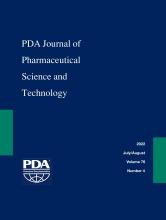Abstract
This article describes a summary of discussions and outcomes from the 2019 Viral Clearance Symposium Session 4 on the utilization of knowledge, both from within and external to a given organization (e.g., across the interdisciplinary space), that supports viral clearance strategy and process understanding, including engagement with Health Authorities in the development and implementation. Several significant areas were identified for prioritization in an ICHQ5A update including application of next-generation sequencing (NGS) and replacement of in vivo tests, resin reuse, and use of a parvovirus as a single model virus for virus filtration. Specific opportunities were identified based on case studies for application of prior knowledge to support risk assessments, to guide viral clearance study designs, and to support viral clearance claims based on a limited number of confirmatory runs. One discussion focused specifically on how to apply best practices and prior knowledge to an assessment of the potential impact of resin reuse on viral clearance. Prior experience showed a trend toward larger log reduction values (LRVs) with reused protein A resin. For other resins, differences in LRV (>1.0) between new and reused resins were mainly found when validation was performed in independent studies, not side by side. Another example of applying prior knowledge was an assessment of potential variability and worst-case retrovirus-like particle (RVLP) levels in unprocessed bulk presented by Paul-Ehrlich-Institut. The opportunity to utilize noninfectious surrogates for viruses (such as RVLPs or parvovirus-like particles) in screening experiments to determine the impact of process parameters on viral clearance, and the associated current limitations owing to analytics, was also reviewed.
- © PDA, Inc. 2022
PDA members receive access to all articles published in the current year and previous volume year. Institutional subscribers received access to all content. Log in below to receive access to this article if you are either of these.
If you are neither or you are a PDA member trying to access an article outside of your membership license, then you must purchase access to this article (below). If you do not have a username or password for JPST, you will be required to create an account prior to purchasing.
Full issue PDFs are for PDA members only.
Note to pda.org users
The PDA and PDA bookstore websites (www.pda.org and www.pda.org/bookstore) are separate websites from the PDA JPST website. When you first join PDA, your initial UserID and Password are sent to HighWirePress to create your PDA JPST account. Subsequent UserrID and Password changes required at the PDA websites will not pass on to PDA JPST and vice versa. If you forget your PDA JPST UserID and/or Password, you can request help to retrieve UserID and reset Password below.






